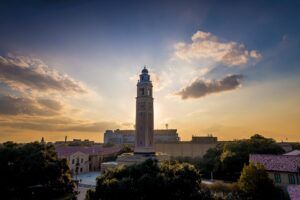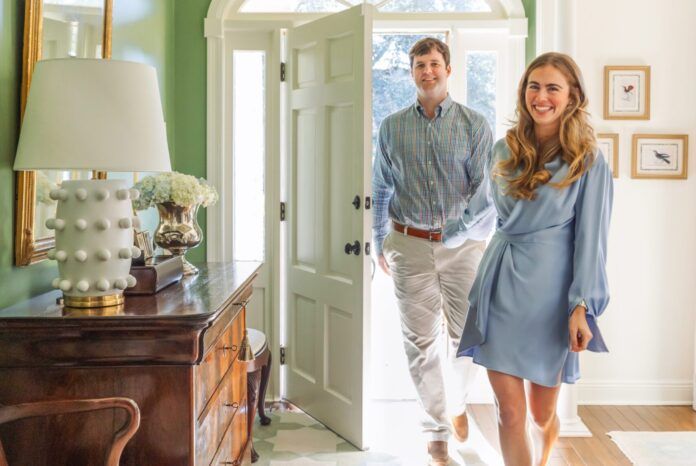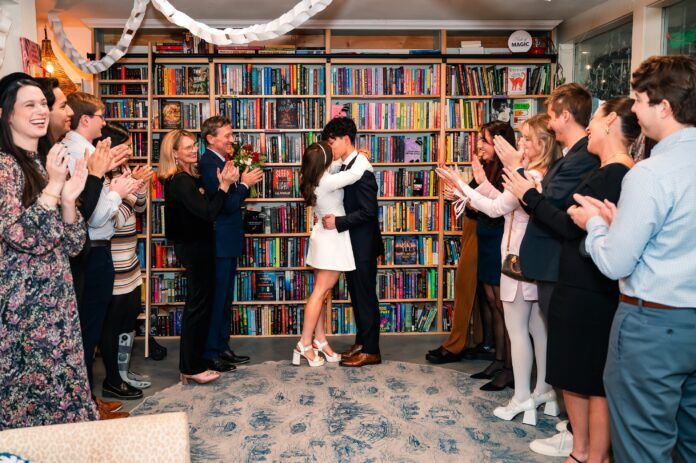Creativity in motion – Cellist, sculptor and LSU professor Dennis Parker is an artist on the move
View a gallery of all of Dennis Parker’s works.
Nothing about Dennis Parker is static. From his cello playing around the world to the many movable parts on his artwork, everything about this cellist, sculptor and professor at the LSU School of Music is imbued with a sense of creative movement. He views Louisiana as home but travels extensively for his musical pursuits. Parker can be spotted giving a recital in New York, conducting in Colombia, playing chamber music at a Panamanian festival, teaching lessons at a Brazilian conservatory, soloing with an orchestra in China, or premiering a cello concerto in Turkey.
“When I’m not doing stuff, that’s when I’m in trouble. … I try to keep burning through hours of the day,” Parker says. “There are usually so many things running at the same time.” His many ongoing projects and performances organically create more opportunities. “Every time you go somewhere, it begets more invitations. You go play in Instanbul, and you meet people who invite you to play next year in Izmir. One year you’re in Medellín [Colombia], and the next year you’re going to Bogotá. It just keeps replenishing. And I love travel. I just have this kind of wanderlust.”
This year in particular has been a busy one for Parker. Thanks to the Atlas Grant, awarded to him by the Louisiana Board of Regents, he is able to pursue numerous projects dear to his heart. He performed at Carnegie Hall’s Weill Recital Hall in May during a sabbatical for travels and concerts enabled by the grant. The additional funds also led to two new CDs of Parker’s music, including recordings of Brazilian composer Walter Burle-Marx’s work for cello and transcriptions of two pieces by Mozart.
“The Board of Regents was very generous,” says Parker. “It’s been an enormous boost to have.”
A New York native with artistic parents who nurtured his creative spark, Parker began studying cello at the age of 6, receiving lessons from a professor at Juilliard for eight years before attending Indiana University School of Music. Parker landed his first orchestral job after winning at a cello competition in Brazil. Eleazar de Carvalho, a member of the jury and conductor of the Porto Alegre and Săo Paulo orchestras, approached the young musician after the competition and offered him the position of principal cellist with the Porto Alegre orchestra. Parker jumped at the opportunity. “What 22-year-old wasn’t going to want to go to ‘Happy Port’ Brazil?”
Parker spent two years working and traveling in Brazil, cultivating a relationship with the country that he has sustained. “I just really loved the feeling of being there. Since then I’ve gone back twice a year to Brazil.”
Upon leaving Porto Alegre, Parker pursued his graduate studies at Yale under the brilliant cellist Aldo Parisot. It was during this time that he met his wife, visual artist, poet, and now LSU instructor Jacqueline Dee Parker. In 1988 he decided to apply for a teaching position at LSU. “I didn’t really know much about the school or Louisiana or anything. In our business you tend to go where the jobs are.”
But Parker found much more than a paycheck in Baton Rouge. He has lived here for 25 years (in the same house, though he has rebuilt it three times) and feels naturally at home with Louisiana culture.
“I absolutely love the lifestyle here,” says Parker. “I think Louisiana is the state in the country that’s the most similar to Brazil. They’ve got carnival; we’ve got Mardi Gras. They’ve got Rio; we’ve got New Orleans. Plus I appreciate that there’s such a deep-rooted musical history here.”
This rich musical history contributes directly to the success and reputation of the LSU School of Music, according to its former dean, Laurence Kaptain: “Louisiana’s culture and ambiance is conducive to creativity and the performing arts. The openness of the people allows artists to do their best work—knowing that the expressive arts are valued.”
Parker is an integral part of continuing this musical legacy. “The LSU School of Music excels, in part, because of the foreign students who come for undergraduate and graduate study,” says Kaptain. “Dennis Parker remains a big attraction to students from all over the world, but especially from Brazil. … And to this day students of former students make great sacrifices to travel to Baton Rouge and study with him and other artist faculty.”
Bill Kelley, sound engineer at the school as well as longtime neighbor and friend of the cellist, can attest to his impact on students. “His students rave about him and work hard to learn everything he has to teach them,” says Kelley. “I’ve learned that in his studio, Dennis doesn’t simply teach cello. He tailors his approach to each student based on their strengths and weaknesses. The result is, each of his students remains unique and they each excel, as nature would have it.”
Parker’s creative nature is not limited to his musical pursuits. When not giving lessons, spending time with family, or traveling abroad, Parker is often tinkering in the workshop behind his house. There his artistic pursuits take a wholly different form, through sculptures made of found objects and broken musical instruments. For Dennis, sculpting allows creative expression without the pressures and repetition inherent in classical music performance. “It’s nice,” he says, standing among his creations, “I come out here, and I can start an idea and finish it. And be done. In music there’s really no end—you reach one level and you’re happy with it, but you just keep going to the next. It’s a constant challenge. ”
The unique sculptures frequently include a movable element—like a doll torso or a figurine—that encourages the viewer to interact with it, thereby taking part in the creative process. Parker occasionally sells his art, but is more likely to give it away or donate it to art auctions for charities like Habitat for Humanity. “Almost everywhere I go, I like to bring something or leave something,” he says. “It’s hard to even part with these things unless you’re going to give them to someone you care about.”
Parker will be giving local music lovers a special treat this fall when he performs Shostakovich’s Cello Concerto No. 1 with the Baton Rouge Symphony Orchestra on Nov. 14. Written in Soviet Russia in 1959, the composition slyly communicates “the hardship, panic, the lifestyle of fear that people lived in [during Stalin’s reign].” Parker says. “It’s conveyed in all sorts of skittish, horribly sarcastic musical expressions. I’m thrilled to be doing this piece.”
For the future, Parker has no intention of stopping the perpetual motion that is his life. “I just want to keep traveling, keep thinking of new things to do. I’m happy as long as I keep finding new things to do. I love change.” ¦
Learn more about Dennis Parker’s music and sculpture at dennisparkerland.com.











